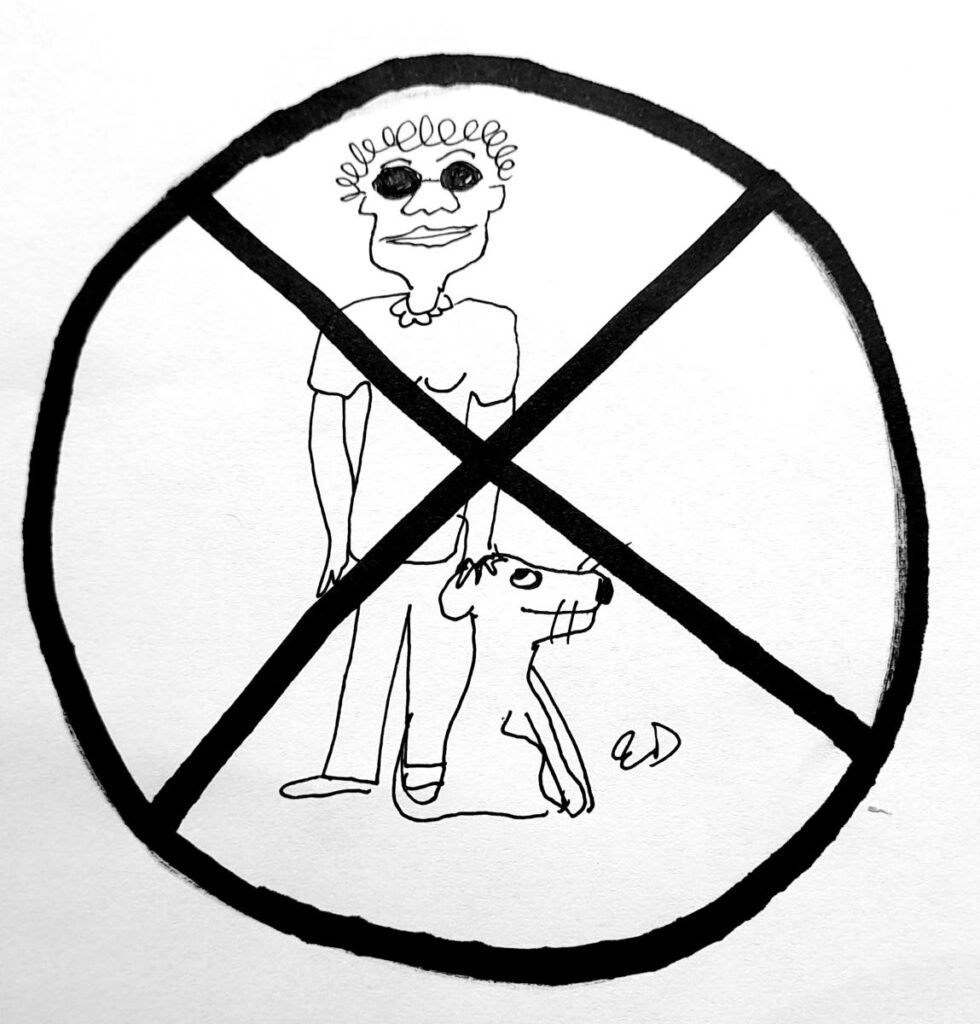No pets allowed

Recently, three establishments I visited in Trinidad had "No Pets Allowed" stickers on their entrance doors.
Never having noticed such signs in Trinidad or Tobago, I wondered if there was a surge of citizens attempting to take their pets into stores.
It is easy to envision how this could happen. More and more people are taking their dogs out with them – for leisure drives, to the beach or a lime, to drop children to school or spouses to work, etc.
If a dog is in the car and one wants to stop at an establishment to pick up an item, options include leaving the dog in the vehicle with windows rolled down (a no-no in Trinidad, where car theft is a high possibility)...leaving the dog in the car with windows up, engine running and air condition unit on (also risky)...or taking the dog into the store.
TT is generally not a place where animals are accepted indoors, even in domestic settings. While an increasing number of locals keep their dogs (mainly small house dogs) indoors or allow them to be indoor/outdoor, many still perceive dogs as creatures for the yard, meant to keep watch.
I called a popular establishment to find out the reason for their "No Pets Allowed" sign.
“People bring their animals inside,” the woman on the other end of the phone responded.

“What kind of animals?” I asked, not expecting the answer that followed.
“Mainly birds in cages. They walk around with them and they make a lot of noise.”
I was further informed that while there are customers who love animals, there are those who complain about them, owing to allergies or the fact that dogs "poop." Hence the signage.
Unfortunately, the company did not have a clear policy on accepting service dogs. Service dogs are specifically trained to help people with disabilities lead more independent lives. They are working dogs who, while treated well, are not considered "pets." Atlas Dog, a US-based "assistance dog" organisation, describes service/assistance dogs as “crucial life partners. They are inseparable from their human companions because they provide an invaluable and life-saving service.”
Maureen, a female acquaintance who is an inspiration to all, was born blind. In addition to being extremely independent, she is a trailblazer. Her first internationally-trained seeing eye dog, Patches (now deceased), was the first-ever guide dog in TT. He accompanied her everywhere, even travelling with her in taxis...that is, those rare taxis that accepted them. As an independent woman, Maureen was quite able to enter any store with Patches and effectively conduct business. Such independence should not be thwarted because her assistant, an animal, is barred from entry.
Maureen now lives in the US, where service dogs are widely accepted (indoors and out) and their use has increased within the last decade.
In a recent WhatsApp to me on Patches being the first guide dog, Maureen wrote: “He was a real guinea pig and got real blows from all of the adversaries, in terms of being accepted as a guide dog. Trinidadian culture does not recognise this. Perhaps, if the education had continued they may have come around. The few people I know that have guide dogs don't use them as guide dogs. They have them all as pets.”
Regency Recruitment & Resources Ltd. in Port-of-Spain had a "No Pets Allowed" sign on its door and another stating that (however) service dogs are accepted.
When I asked about this, their chairman, Lara Quentrall-Thomas, responded:
“Thanks for noticing! I think we are one of a very small group of employers who allow service animals in, and in fact, one of our staff brought her dog in recently for the day. We are mostly animal lovers so have no problem with any animal being there. I definitely have not had any requests for service animals to be allowed in though. The sticker was more to raise awareness than to respond to a demand.”
With the exception of Maureen and Patches, I cannot recall seeing service dogs at work anywhere in TT.
It is indeed important to raise awareness on the need for and importance of these animals that can enhance the lives of many of our disabled citizens.
If these service animals were more visible at work in our society, TT might embrace a more open-minded view of even pet dogs being accepted in indoor public spaces.


Comments
"No pets allowed"